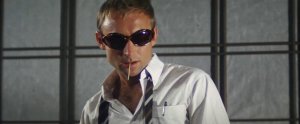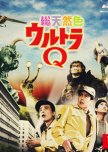
Where it all began
Ultra Q is very much the Japanese equivalent of shows such as The Twilight Zone and The Outer Limits. It's full of imaginative concepts and stories that when combined with the excellent production qualities of Eiji Tsuburaya you are left with one of the most unique shows of a lifetime. It's a tremendous blend of classic Tokusatsu science-fiction and horror that despite only being 28 episodes long, still leaves an impact. Of course, Season 2 of the show was long abandoned but naturally developed into the Ultraman series we all know and love today.Esta resenha foi útil para você?

Zone Fight Power!
While I do ultimately feel that Zone Fighter is nothing more than an attempt by Toho to cash in on Tsuburaya Production's territory, Zone Fighter eventually manages to do enough to stand out amongst the seemingly endless surplus of Ultra shows with its family of superhero's dynamic plus some memorable guest stars in the form of Godzilla and company.The evil Garogas plan to take over Earth with their army of giant Terror-Beasts. They are opposed by the Zone Family, hailing from a planet called Peaceland that the Garogas destroyed. The family uses a variety of exotic vehicles and weapons. Still, their best defence against Garogas is their oldest child Hikaru, who is able to transform into the giant Zone Fighter.
The problem with Zone Fighter comes a lot from the tone, less so the production. It's a show that gets confused often as to what it wants to be. Some episodes are great, others border on unwatchable. It's a series Toho isn't especially proud of and director Jun Fukuda when asked about the show in interviews refused to even comment on its existence. Not really a good sign for the show in general.
The visual effects work stands up quite well for the most part with a multitude of different talents lending themselves to the series. Teruyoshi Nakano for 10 of the 26 episodes. Koichi Kawakita for 8. Yoshio Tabuchi for 6. Shinichi Kamisawa, who also wrote for the series, 2 episodes a piece. The direction is hit or miss, the ones directed by either Ishirō Honda or Jun Fukuda tend to be the more interesting ones and there are even two later episodes directed by Kōhei Oguri of House fame. So the show is hardly lacking in the visual department.
Further problems stem more from its writing and characters than anything else. At times juvenile and childish other times dark and sinister, the more childlike episodes stick out a lot more, it doesn't help one of the main characters is a child and his friends make frequent appearances with some godawful child acting to boot. Kazuya Aoyama, later appearing in Godzilla vs. Mechagodzilla, as the titular Zone Fighter does pretty much carry the show for the most part alongside Shiro Amakusa even if his role is massively reduced to that of a mentor. The rest of the characters, especially the villains are very give or take.
The music by Go Misawa is fine overall, the main theme "Zone Fighter" and the insert song "Meteor Victory" however, are massive earworms that won't leave you alone no matter how hard you try to erase them. There's a large usage of horns and brass present throughout and it can get overwhelming at points.
What really got me interested was Zone Fighter's presence in the Shōwa era Godzilla timeline, taking place after vs. Megalon but before vs. Mechagodzilla. It features the likes of Godzilla himself, King Ghidorah making an appearance in two episodes duking it out with Zone Fighter and not Godzilla and ultimately remains the only monster to not be killed by either in the show and finally the final appearance of Shōwa era Gigan. What happens to Gigan in this is almost unacceptable in terms of how he's defeated by the villain's incompetence more than the abilities of Godzilla or Zone Fighter. My poor boy.
Zone Fighter is a very real oddity of Shōwa Godzilla. It doesn't utilise its unique selling point to its full potential, as the show always ensures that Hikaru remains front and centre as its main hero. As much as it would like to reassure you that Zone Angel and Zone Junior are a key part of the show, ultimately it's always Hikaru that saves the day whilst Angel and Junior are acting as support. It's a shame because the glimpses you see of these supporting characters taking centre stage show you exactly just how remarkable Zone Fighter could have been but it seems to have been destined to end on an unresolved cliffhanger which I imagine Toho have no intention of ending.
Esta resenha foi útil para você?
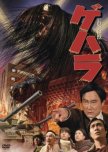
So much hair
One of the better kaiju throwbacks I've seen in recent years, Geharha: The Dark and Long-Haired Monster owes a lot to the bigger name franchises containing a wealth of references and homages interspaced amidst its quirky camp. A short made-for-TV production by one of the more prolific modern Ultraman directors, Kiyotaka Taguchi, barely clocking in at 20 minutes in length, it's a fabulous little gem. The effects are a charming mix of old-school tokusatsu techniques and hilariously low-brow CGI which often add to the short's comedic value. While the stock library of music from the late Akira Ifukube fits quite nicely, Geharha is over just as it really starts to get going, leaving you wanting more and ripe for expansion in a feature-length presentation.Esta resenha foi útil para você?
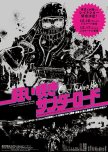
Crazy Biker Road
Often hailed as Japan's Mad Max, Crazy Thunder Road becomes all the more impressive the more you learn about its production. Being a graduation project by director Gakuryû Ishii, it may be a narrative mess but the highly experimental style and limitless rockabilly energy produced a movie that radiates of pure aggression. There's a rough and ready charm to the effects and Kinji Fukasaku-influenced action, often drawing comparisons to Fukasaku's own anti-establishment protagonists with added grunge, grim and neon lights. The soundtrack is honestly my favourite part of the film, using songs by Japanese bands of the time in a near musical sense, it's combined with frantic editing and heightened emotions that immerse you completely within its context. Fast-paced, quick-witted and brilliantly stylised Crazy Thunder Road points toward a new style of genre filmmaking even if that direction is somewhat confused in execution.Esta resenha foi útil para você?
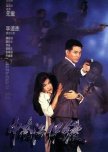
A superior Bodyguard
The Bodyguard from Beijing is a bit of lively, unpretentious fun that takes Mick Jackson's The Bodyguard but replaces Kevin Costner with Jet Li and the weird musical numbers with kung fu. Corey Yuen directs with a visceral energy that wouldn't be out of place in a Wong Jing movie and although, the writing is certainly a bit on the hokey side Li's charisma as a real man's man shines through. With plenty of high-energy and varied gunfights to keep you engrossed, a solid musical score and a fantastic final fight to boot elevate what could have otherwise ended up as a rather undercooked and stale riff, yes it's rather generic but there's a heart-beating somewhere underneath its surface.Esta resenha foi útil para você?

The blueprint for Minus One
Complicated and nuanced as equally as it is populist and compelling, Takashi Yamazaki's The Eternal Zero is way too cluttered to assign any form of accurate assessment and yet, this highly thought-provoking tale on redemption and legacy is highly worthy of your time. Yamazaki effortlessly weaves together an engaging, expressive, sometimes exciting yet often horrifying depiction of a disgraced kamikaze pilot's life, never glorifying the nightmarish situation and always remaining sombre. The great performances sell the otherwise muddled script while its aerial combat is staggeringly realised with Yamazaki's creative use of visual effects and kinetic camerawork. More solemn and graceful, emotional and tragic, than downright high-octane and death-crazed as depicted in some Western war films, The Eternal Zero is an enormously evocative film even though it stumbles upon its final approach with an exceptionally jarring and sappy epilogue that feels very out of place with this otherwise excellent film.Esta resenha foi útil para você?

Not the ending I'd hoped for
As the ending of a trilogy, Always Sunset on Third Street '64 isn't that great, it feels more like the build-up to the finale but ends before we get there. It also gets very confused about what sort of messaging it wants to send towards how to treat your children, but it ties up all the hanging threads it starts without losing the shtick that made the first two so special in the first place. Great performances, exceptionally wholesome and very well directed, Yamazaki could very well deliver one more film if he so wished, but I respect him for leaving it as a very personal trilogy to both him and his viewers.Esta resenha foi útil para você?

More of what made the first one so damn special
Always Sunset on Third Street 2 offers more of what made the first one so damn wholesome, at times much more bittersweet, it retains the goodwill and warmth of its predecessor. Still just as unabashedly nostalgic and touching, Always 2 is exceptionally self-indulgent, very saccharine and perhaps a bit overlong, but it's also an excellent example of an emotionally satisfying drama with likeable characters and a wonderful sense of place and time. One that doesn't fail to get the tears welling, making for a feel-good film with loads of laughs. Extremely refreshing and just the tonic in these austere and pessimistic times. It shines bright. Although you just know every Godzilla fan has seen the opening 2-minutes of this and then nothing further, a huge injustice if there ever was one. However, you can certainly see why Yamazaki was chosen to helm the latest outing for the Big G with this sequence... I can't wait.Esta resenha foi útil para você?
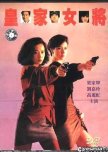
She shoots, but does she score?
She shoots, but does she score? Well, between the copious amounts of histrionic, clichéd melodrama with scenes that go on for way too long, She Shoots Straight provides some genuinely uproarious and well-done action that wouldn't be out of place this side of Michelle Yeoh. Corey Yuen certainly brings variety to the film's kinetic style, particular standouts being a shootout shot in infrared and the storming of a ship with every manner of melee weapon imaginable, Yuen understands when to add a dramatic weight to make a true impact. Complimented by a decent if cheesy score by Lowell Lo, while the performances of Joyce Godenzi and Carina Lau balance out the deranged villainous antics of Yuen Wah. She Shoots Straight isn't bad by any means but the story doesn't make me really care about any of its sapy soap opera characters beyond a surface level while the action is too few and far between but finally delivers that explosive Hong Kong finale that you wait the whole film for, it just really needed some spicing up during the sluggish first half.Also, Joyce Godenzi should have totally lost that final fight against Agnes Aurelio.
Esta resenha foi útil para você?
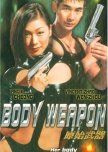
Overly sexed cheese
Even with its mean-spirited streak, Body Weapon is a rather daring psychological thriller that combines the twisted sexuality and flamboyant savagery of Naked Killer with the physical masterstrokes of Jackie Chan in high gear. It's a relatively infamous Category III movie, but despite its status as one, it rarely goes above what one would expect from a sleazy exploitation film based solely on its gimmicky title. Between the tonally confused yet hilariously cheesy jokes, plodding sentimentality and overly sexed-up gimp-suited villain, Body Weapon offers up a tantalising amphetamine rush of brutal martial arts and steamy eroticism that impacts the senses with delirious intensity.Esta resenha foi útil para você?
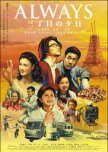
Lavishly heartwarming
Takashi Yamazaki's lavish screen adaptation of Ryōhei Saigan's immensely popular manga, Always Sunset on Third Street is unashamedly sentimental, a glossy, big-budgeted soap opera remaining captivating in its swoon of admiration for the period it is portraying. It's not intended as a serious examination of the tribulations faced by post-war Japan, though hints are thrown in now and again, instead, it focuses on the daily lives of its larger-than-life characters. Although it sometimes feels episodic, the cornerstone of this movie's success lies in its charming essence, lovable performances and overall warmth, sweeping the viewer along with its energy, tugging at the heartstrings every step of the way.Esta resenha foi útil para você?
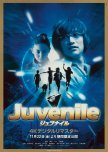
Exceptionally charming adventure film
Drawing heavily from kids' adventure films, ergo The Goonies just minus the gritty edge of the 80s and early Spielberg, Juvenile marks the directorial debut of one Takashi Yamazaki. He weaves together an engaging coming-of-age story primarily following the child characters and invoking a sense of imagination many kids partook in during the early years of their lives, retaining an old-school sci-fi charm along the way. It all feels genuine and is helped by the performances of its cast, although it does struggle to make many of the relationships organic. Its musical score by Yasuaki Shimizu is pleasant on the ears, with a beautiful theme to close the film the visual effects however, are more of a mixed bag. The CGI has aged horribly as was par for the course in Japan during this period but the practical effects work is fantastic, especially Tetra who is freaking adorable. Despite its faults, Juvenile is a competently made movie and an exceptionally charming one at that, capturing that feeling of childhood nostalgia with relative ease, Yamazai had a lot to offer and Juvenile was the first stepping stone to that success.Esta resenha foi útil para você?

A bold if messy ghost story
Diving deep into the emotional longevity of what grief can inflict on an individual, Missing does not feel like a Tsui Hark film, as it's so far removed from his style. Mixing traditional supernatural beliefs with a psychological character study, Hark spins a tangled, often confusing web that while laudable doesn't quite sustain his ambitions. It instead offers a hodge-podge of genres ranging from psychological ghostly horrors to melodramatic romance, the very idea of the film is exciting but it has too many ingredients that ultimately leave it as a very messy piece of work, often looking hurriedly shot and put together almost as if it was made in a mad rush of a creative spark. It drags its feet to a rather unsatisfactory conclusion of multiple endings, feeling way longer than its advertised 2-hour runtime. Thankfully in the years, Hark's direction has remained steadfast and enjoyable, backed up by a passable score by Ricky Ho, Missing ultimately just misses the mark for me in its attempt to try so much, though the effort involved is commendable, the results are not.Esta resenha foi útil para você?
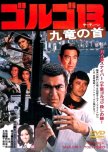
Another banger of an adaptation
Going into Assignment Kowloon, I was half expecting to see a campy 70s chop-socky interpretation which capitalised more on the success and fame of Sonny Chiba to earn a quick buck. But as it turns out, this is not only a damn fine representation of its source material but a damn fine movie in its own right. Golgo 13 seemingly had two of the best pieces of castings regarding live-action because Sonny Chiba is as much a dead-ringer as Ken Takakura was just for different reasons. Chiba's Golgo is much less human than Takakura's with a stone-faced expression that never leaves his face but makes exceptional use of his skills as a martial artist and stunt performer in some very grounded fight sequences and impressively daring stunt work. Director Yukio Noda makes excellent use of the film's variety of locations, from Hong Kong to Miami back to Japan, and although the film does stutter at first (most notably with some poor editing) it quickly finds its feet and maintains a very stylish atmosphere that simply oozes coolness throughout.Esta resenha foi útil para você?
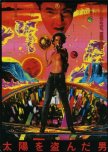
A perfect companion to Oppenheimer
The Man Who Stole the Sun treads the finest of lines in trying to balance its subject matter and tone, but Kazuhiko Hasegawa's controversial movie about nuclear terrorism is a darkly comedic and thrilling satire on a subject once considered unsatiriseable annihilating any form of genre borders in the process. Holding particular resonance for Japanese audiences, as while the country does use nuclear power, it has long held against amassing a nuclear arsenal due to the devastating effects that ended World War II. The movie doesn't stop dead for any form of long-winded nationalistic or philosophical speeches and instead insists on a conceivable reality with seemingly no motivation.One of only two movies directed by Kazuhiko Hasegawa, which in turn feels like a crime in itself, Hasegawa rewards the viewer with some utterly sublime direction and excellent framing, with plenty of thrilling action set pieces to command his viewer's attention at all times (the car chase feels like it was ripped right out of a Ringo Lam movie). It balances the unorthodox nature and tone of the movie exceptionally well, juxtaposing the shifts with unnatural ease. Complimented by funky and often ill-fitting music by Takayuki Inoue to glorious success.
The performances are all excellent, with Kenji Sawada playing the everyman gone rogue with an endless amount of animosity slowly succumbing to the effects of radiation poisoning making him more and more unpredictable as the movie goes on. But it's the award-winning performance from the stoic and hardened Bunta Sugawara that really captivates me as he normally does in his roles, single-minded and exceptionally driven.
Overall, The Man Who Stole the Sun, even at two and a half hours long, never feels overly long or bloated. The film absolutely refuses to limit itself, and that's why it's so entertaining and impressive.
Esta resenha foi útil para você?

